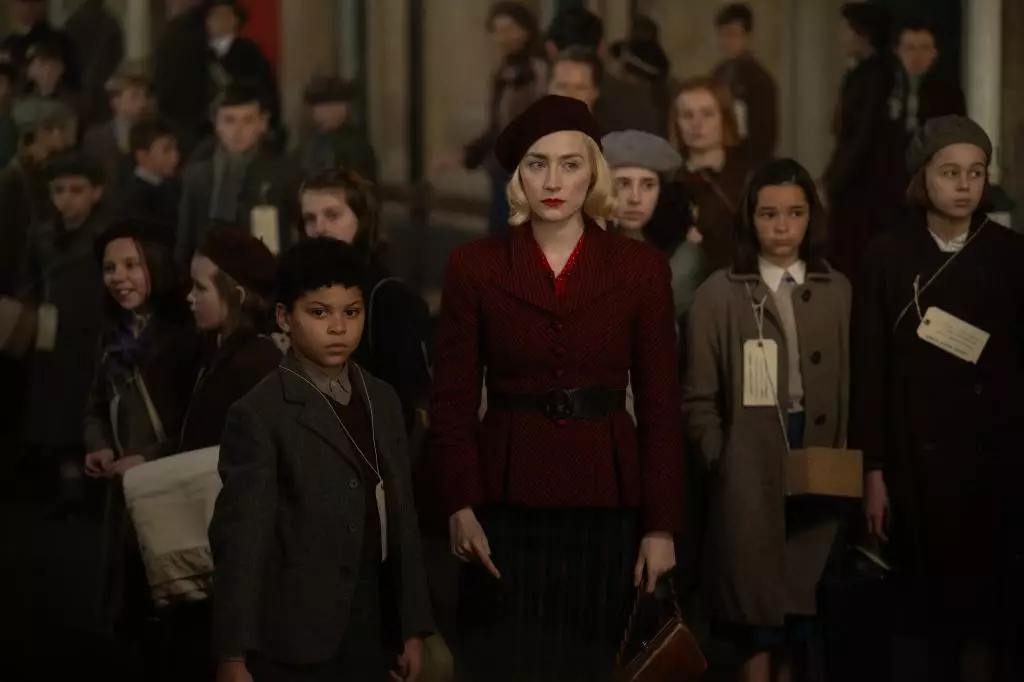Steve McQueen’s 2023 film “Blitz” transports audiences back to one of Britain’s darkest hours during World War II, effectively illuminating the turmoil of the Blitzkrieg through the innocent perspective of a young biracial boy named George. Following the director’s success with the 4 1/2-hour documentary “Occupied City,” which vividly accounts for the Nazi occupation of Amsterdam, McQueen embarks on an emotionally charged narrative exploration of resilience, family, and survival amidst the chaos of urban warfare. The film debuted as the opening night attraction of the London Film Festival and is set for a theatrical release as well as a streaming premiere on Apple TV+, indicating its anticipated impact within contemporary cinema.
Blitz is not merely a recounting of historical events; it is an intricate tapestry interwoven with the experiences of ordinary people. McQueen meticulously researched the period to establish a realistic, yet poignant storytelling approach. Following pregnant Rita (played with depth by Saoirse Ronan), George’s mother and a munitions factory worker, the narrative vividly captures the struggles of families as they navigate survival while dealing with the relentless vibrations of falling bombs and the fear of loss.
The film does not shy away from showcasing the bombardment’s horror but chooses to focus on humanity and hope amid adversity. George’s early experiences—bullying due to his ethnicity, coupled with the loss of his father’s presence—set a somber backdrop that allows McQueen to explore the inner thoughts and feelings of a child. As the narrative unfolds, viewers are taken through a breathtaking sequence of bombings, artfully depicted not through graphic violence but rather through a chilling sense of anticipation, masterfully crafted by visual effects teams.
The emotional core of Blitz revolves around George’s resolute determination to reunite with his mother after being sent away to seek safety from the blitz. Remarkably portrayed by newcomer Elliot Heffernan, George’s journey is a profound examination of loss, identity, and resilience. As he navigates through adult conflicts and societal issues—encountering a diverse cast of characters, including a Black air-raid warden and a gang of looters—George’s story transcends the war, making it not just a historical narrative but a timeless tale of a child fighting against the odds.
In a time when the world grapples with fresh conflicts and humanitarian crises, McQueen’s portrayal of a child’s plight rings painfully true. The parallels between George’s harrowing experiences during the London Blitz and the turmoil faced by children in today’s war-torn regions evoke a sense of urgency. Historical retellings, like Blitz, become poignant reminders of the cyclical nature of conflict, drawing attention to the ongoing suffering of innocents caught in the crossfire.
McQueen’s attempt to humanize war extends beyond the battlefield. Rita’s narrative—focusing on her resilience as she works tirelessly in a munitions factory while grappling with her own fears of losing her son—compliments George’s journey. The film juxtaposes the noise of war with moments of tenderness and humanity, such as Rita’s singing on a BBC radio show, seamlessly enveloping viewers in a profound emotional experience. The song, co-written by McQueen and Nicholas Britell, serves not only as a melodic respite but also as a heartbreaking reminder of what is at stake amid the noise of conflict.
Artistry and Cinematic Execution
Visually, Blitz is a feast for the senses. With expert cinematography from Yorick Le Saux, every frame is imbued with emotional gravity, aligning with the film’s thematic undercurrents. McQueen’s extensive collaboration with seasoned professionals achieves a synthesis of visual storytelling and narrative depth, capturing everything from the devastation of bombed neighborhoods to the vibrancy of bustling nightclubs before the devastation.
Moreover, McQueen’s choice of a talented ensemble cast—anchored by the performances of Ronan, Heffernan, and supporting actors like Benjamin Clementine—brings the story to life in a way that’s both authentic and relatable. Their portrayals create a melancholic, yet uplifting ambience that resonates long after the credits roll, reminding audiences of our shared humanity in the face of adversity.
Ultimately, “Blitz” isn’t merely an account of historical tribulations; it evolves into a discourse on resilience, community, and the inexorable bonds of family—principles that resonate regardless of time or circumstance. McQueen’s ambitious project not only honors the collective memory of those affected during the Blitz but also serves as a clarion call to recognize and counteract the cyclical nature of violence, underscoring our obligation to ensure future generations do not suffer as past ones have.
As the world looks beyond the shadows of the pandemic and back to existing conflicts, “Blitz” emerges as a vital cinematic reflection, nourishing the crucial dialogue of hope amid despair. By intertwining past and present, McQueen urges us to confront our history, reminding us that the repercussions of conflict continue to shape lives, emphasizing the importance of compassion, solidarity, and resilience in our shared humanity.

Leave a Reply